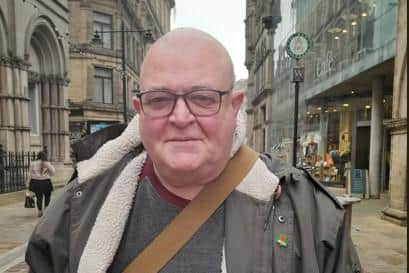First of its kind course designed by people living with dementia is running in Yorkshire
“People make assumptions about what we can and can’t do,” says former truck driver Michael Andrews. “We can still get involved, we can still do things.”
The 64-year-old, who lives in Bradford, was diagnosed with Posterior Cortical Atrophy, a rare type of dementia which causes visual impairment, in 2017, at the age of 57.
Advertisement
Hide AdAdvertisement
Hide Ad“After diagnosis, I went through a really difficult time. I didn’t want to talk to anyone or see anyone,” he says. “There was talk of me having to move into a care home, even though I was - and still am - quite capable of living independently.”


Michael is among more than 20 people from across the country who have been involved in the pioneering development of a new postgraduate module at the University of Bradford. The group of ‘experts by experience’ were given a blank canvas to construct the new MSc module, Understanding the Me in Dementia, with the university’s Centre for Applied Dementia Studies.
As well as identifying the title, topics, exercises, assessment and content - something which has never been done before, they will also be involved in teaching it, alongside academic staff at the university.
“When we started to meet as a group, it was clear we all had experienced the same issues with how people perceive people with dementia, the stigma surrounding dementia and how people communicate with people with dementia,” says Michael, who says he has found “purpose” in helping students and healthcare practitioners understand what it really means to have dementia.
Advertisement
Hide AdAdvertisement
Hide Ad“I hope this module gives healthcare professionals a better understanding of dementia. They have all the theoretical knowledge and all the books, but we want them to understand that we are all individuals and dementia affects us individually.”
At the first of 13 online workshops, people with dementia were asked what they most wanted health and social care professionals to know. “There’s a saying, ‘If you have met one person with dementia, you’ve met one person with dementia’,” said Maq Quereshi, from Stoke-on-Trent. “I wish the professionals would actually use that.”
“Don’t assume,” added Dory Davies, from Flintshire, Wales. “We can still learn new things and people with dementia can still teach others new things.” Allison Batchelor, from Dundonald, Northern Ireland, agreed. “Consult with people with dementia, don’t presume to know what’s best for me. Treat me with respect, I am still me, I am not my dementia.”
The module the group have created will be taught from September 2023, on the MSc Advanced Dementia Studies programme. It can also be taken as a stand-alone, part-time distance learning module for health and social care professionals who care for people living with dementia. Applications to study the module are open until August 18.
